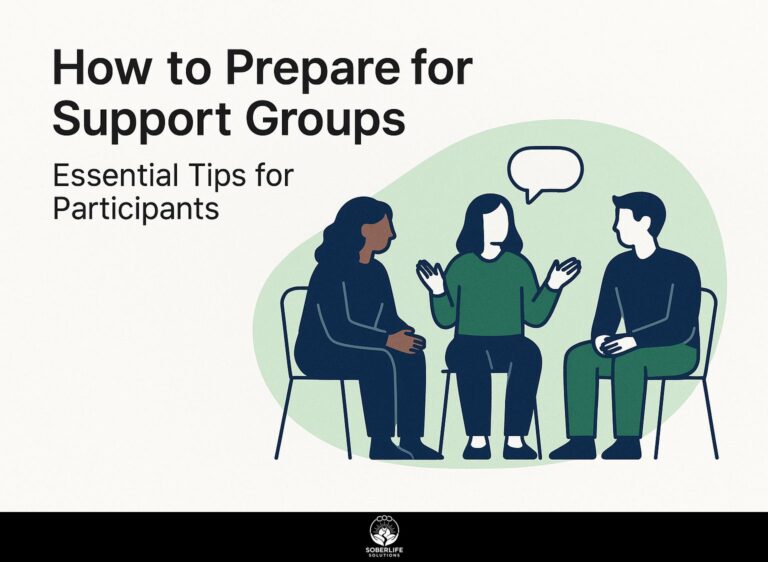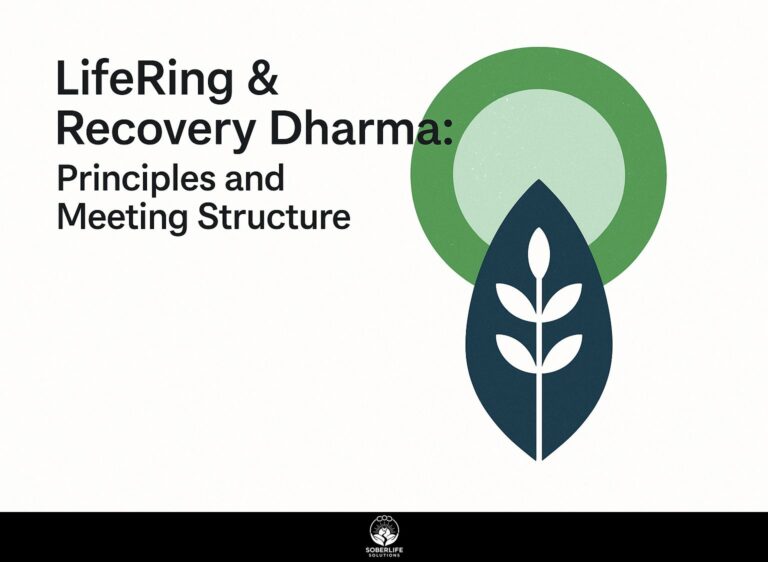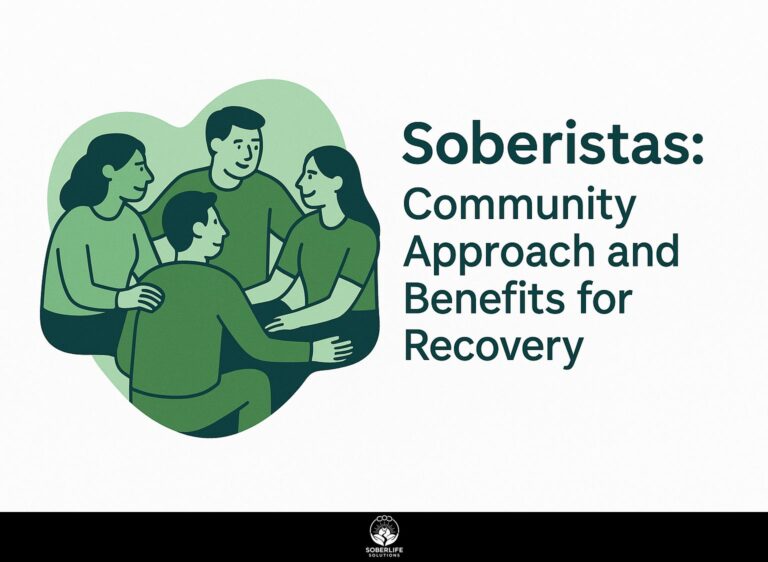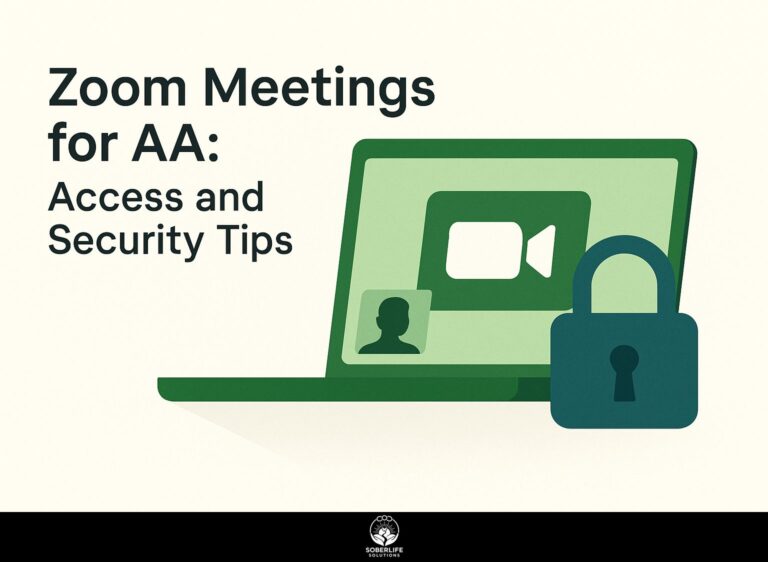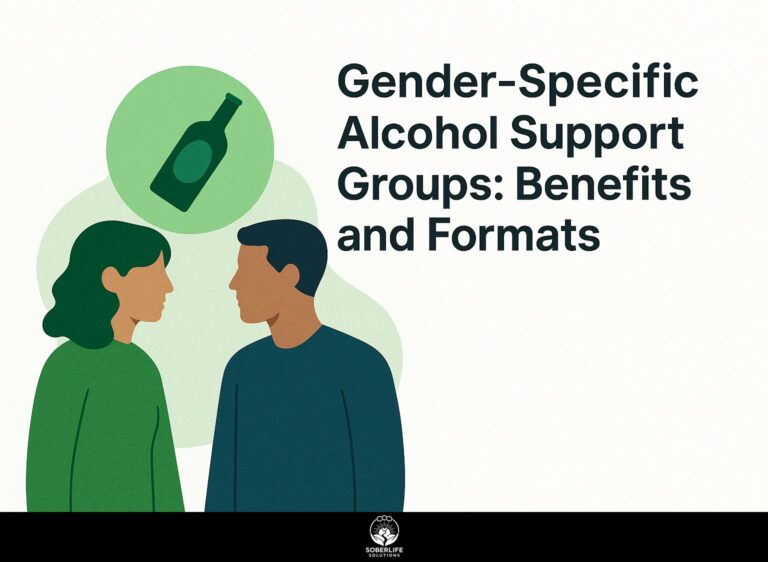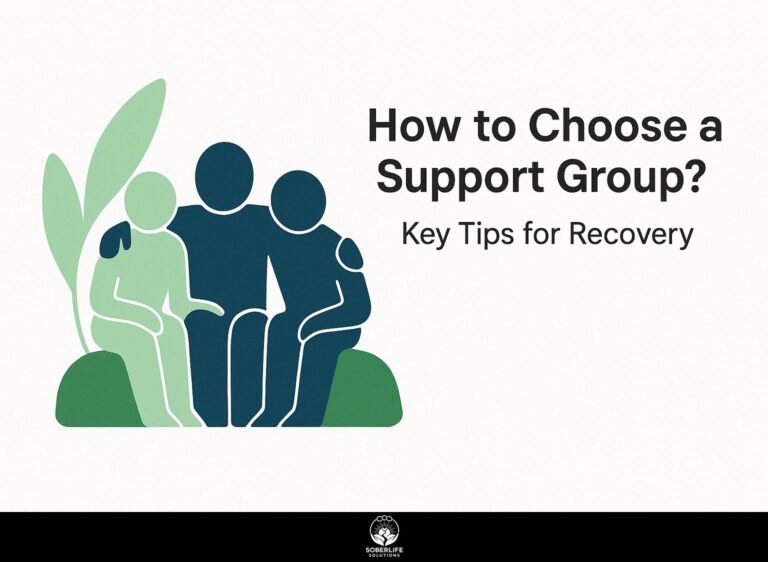SMART Recovery: Principles and Benefits
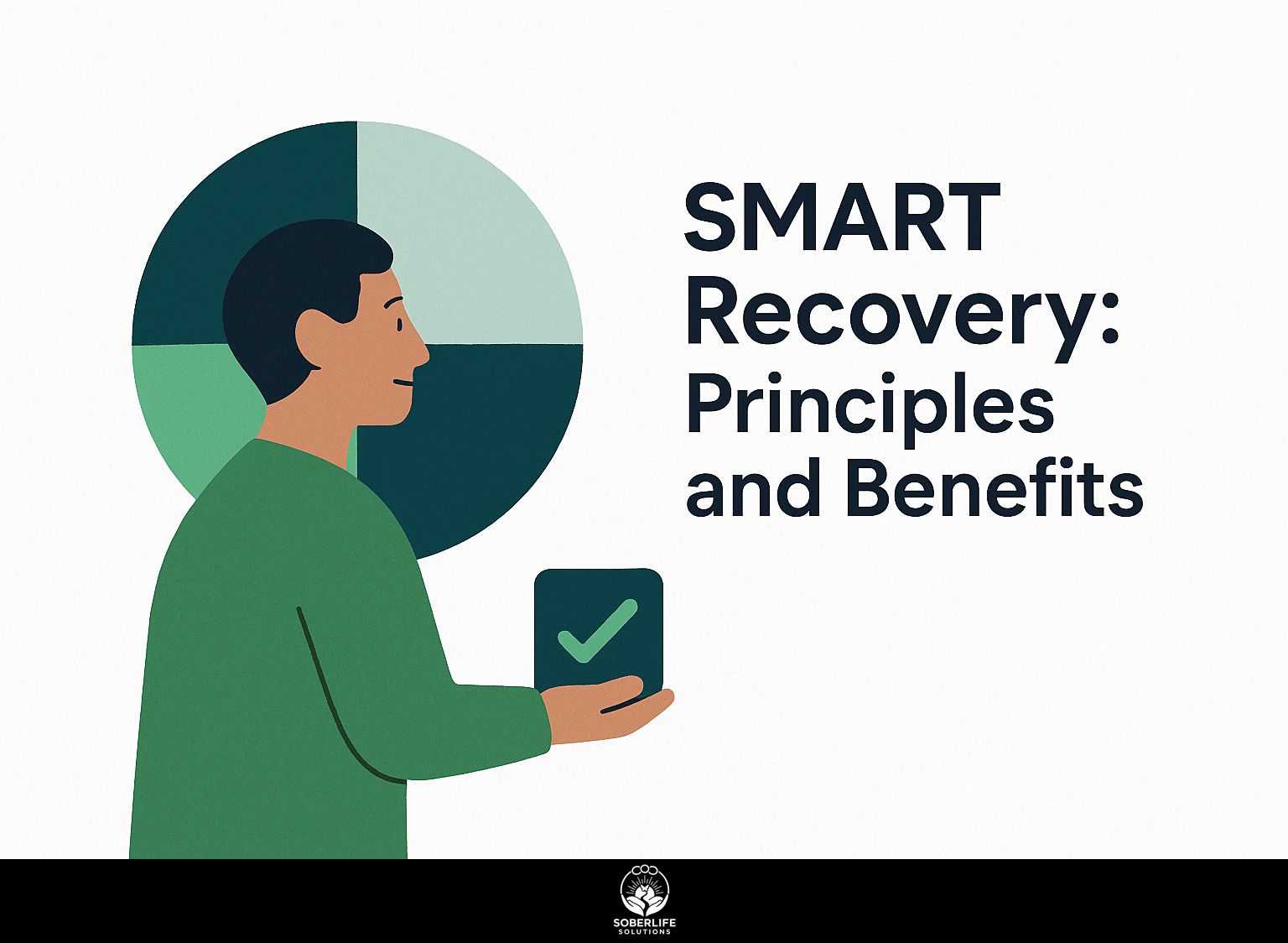
Are you searching for a way to take control of your recovery from addiction? SMART Recovery provides helpful techniques from Cognitive Behavioral Therapy to help people regain control of their lives. With a focus on mutual support and practical strategies, this program encourages personal growth and resilience. In this article, we’ll look at the main ideas of SMART Recovery, what advantages it provides, and how it is different from traditional recovery methods, giving a clear breakdown of this important approach.
Key Takeaways:
Overview of SMART Recovery
SMART Recovery provides a 4-Step Program to aid individuals in taking back control during their recovery.
Each point highlights a key aspect important for personal growth and building confidence.
The first point emphasizes building motivation, encouraging individuals to clarify personal reasons for change.
The second point teaches coping with urges through various techniques, such as distraction or mindfulness exercises.
The third point addresses managing thoughts and behaviors, often using cognitive-behavioral strategies.
The fourth point helps maintain a balanced lifestyle by adding healthy activities, organizing plans, and setting achievable goals.
Participants can use resources such as workbooks or attend local meetings to increase their knowledge and apply these principles.
History and Development
SMART Recovery began in 1994 as a program designed to support individuals. Over the years, it has grown to include techniques that are supported by solid research and evidence.
Over time, SMART Recovery evolved from meetings run by volunteers to a program grounded in scientific research. According to PsychCentral, the development of cognitive-behavioral methods has played a significant role in shaping programs like SMART Recovery.
Notable milestones include the introduction of the ‘4-Point Program,’ which focuses on building motivation, coping with urges, managing thoughts, and leading a balanced life. This approach aligns with the principles outlined in our analysis of peer support groups and their benefits for individuals seeking recovery.
In 2014, SMART began using online tools like video calls and webinars to make their services easier to access. This shift has allowed the organization to reach a wider audience, helping individuals combat addiction through both in-person and virtual support systems.
Core Principles of SMART Recovery
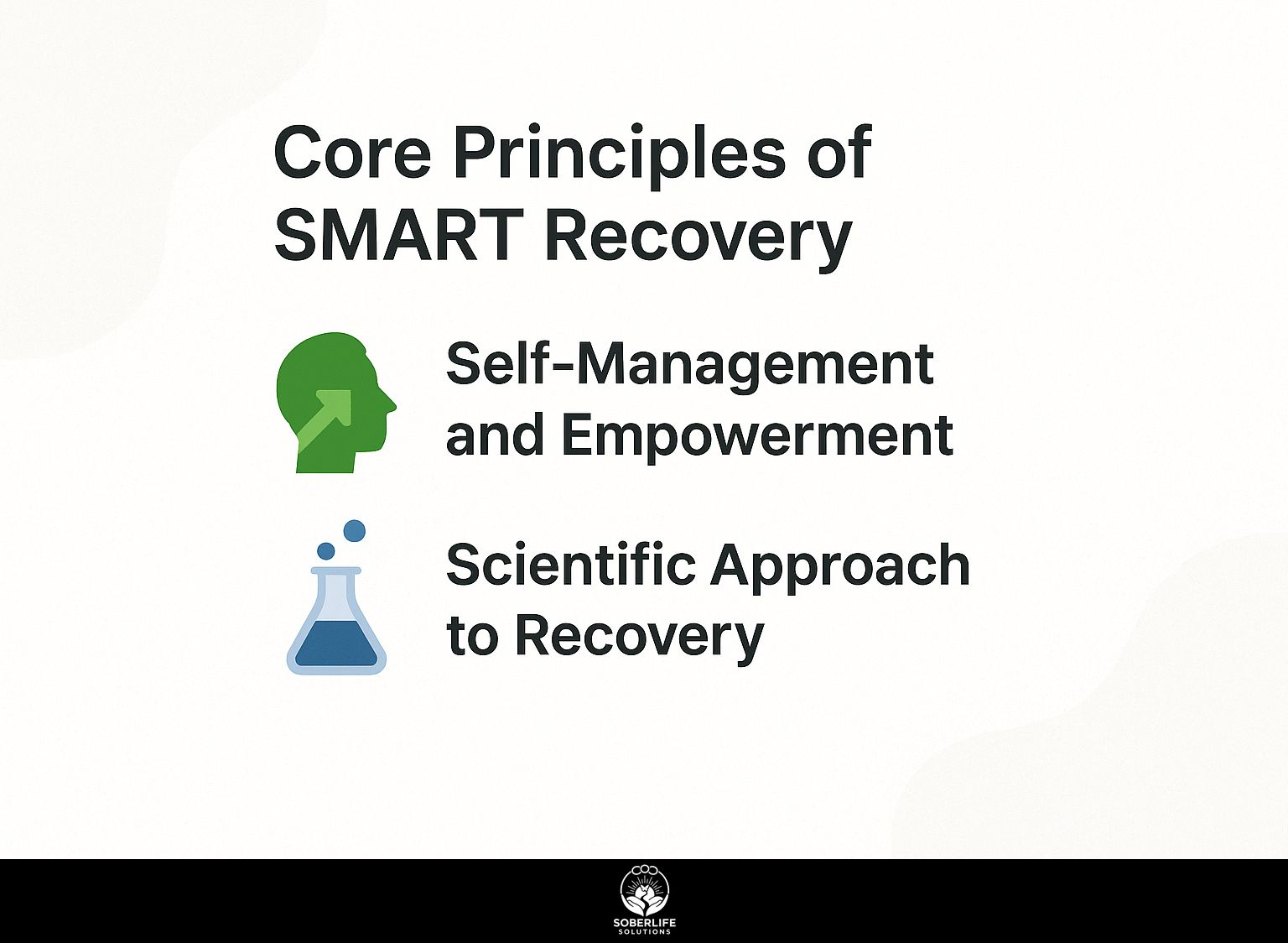
SMART Recovery focuses on four main principles to help people recover. An integral part of this approach involves utilizing cognitive-behavioral therapy techniques, which are particularly effective for those dealing with alcohol use disorder. For further insights, you can explore our detailed examination of how CBT facilitates recovery.
Self-Management and Empowerment
Taking accountability for what you do is a key part of the SMART Recovery method. It encourages you to take charge of your actions and create personal plans for recovery.
SMART Recovery helps people create clear and achievable goals with deadlines. For example, someone might have a goal to go to two support meetings each week to strengthen their support system.
Self-monitoring techniques, such as journaling daily triggers and coping strategies, help individuals recognize patterns in their behavior. The SMART Recovery app lets you monitor your progress and provides tools to keep you motivated.
By participating in these activities, people can better manage their recovery process.
Scientific Approach to Recovery
SMART Recovery uses effective methods like cognitive behavioral therapy to help people make long-term changes in their behavior.
Participants learn to identify and challenge distorted thoughts through structured exercises, such as the ABC model, which outlines Antecedents, Beliefs, and Consequences of behavior.
For example, when someone experiences cravings, they look at what caused it and the beliefs that follow. They might find unhelpful thoughts like “I can’t handle life without this substance.” By changing these beliefs to more reasonable ones, they become stronger.
SMART provides tools such as a daily checklist for users to track their progress and develop better habits. This boosts confidence and supports positive thinking. A recent publication by JAMA Network underscores the effectiveness of combining these cognitive approaches with other therapies. For additional support, consider exploring the benefits of sober support systems that help individuals maintain their recovery journey.
SMART Recovery Tools
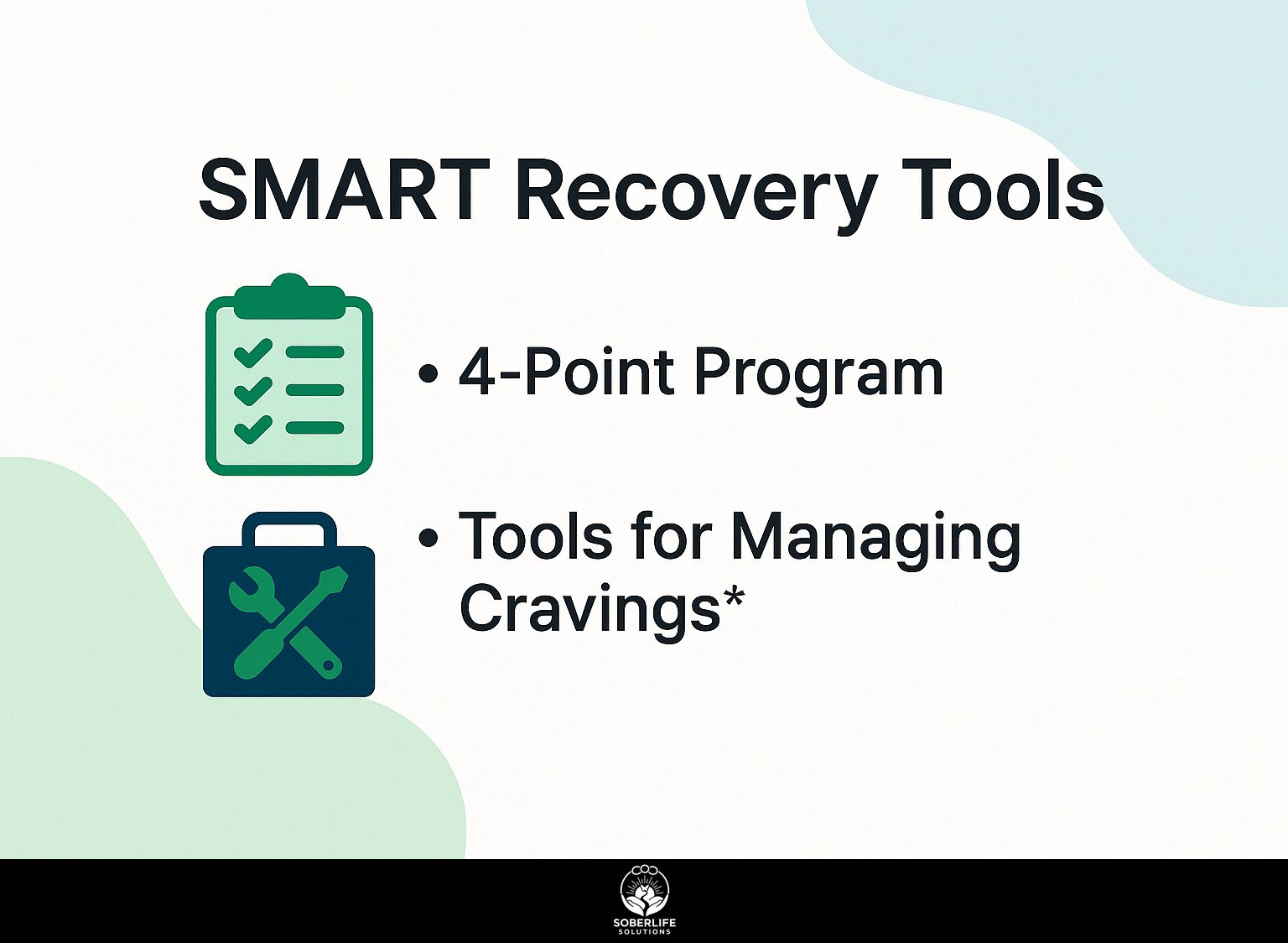
SMART Recovery provides various tools to help people manage their cravings and improve their recovery plans.
4-Point Program
The 4-Point Program consists of specific strategies aimed at enhancing motivation, coping with urges, and building a fulfilling life.
- To increase motivation, set clear and attainable goals and celebrate small successes along the way.
- Coping with urges can involve techniques like deep breathing or engaging in a physical activity to redirect focus.
- Writing in a daily journal can help you notice patterns and triggers in your thoughts and actions.
- Living a balanced life requires scheduling time for both work and relaxation, incorporating activities that you enjoy and that nurture your well-being.
These strategies collectively promote a healthier, more balanced lifestyle.
Tools for Managing Cravings
SMART Recovery offers techniques and approaches to help individuals manage their urges.
One important tool is the Craving Management Worksheet, which helps people recognize and handle specific triggers.
Using mindfulness techniques, like deep-breathing exercises or meditation, can increase self-awareness during cravings.
Implementing distraction strategies, like engaging in a hobby or physical activity, allows individuals to redirect their focus.
Using these methods together can build a strong set of tools for controlling cravings, building strength, and lowering the chances of falling back.
Benefits of SMART Recovery
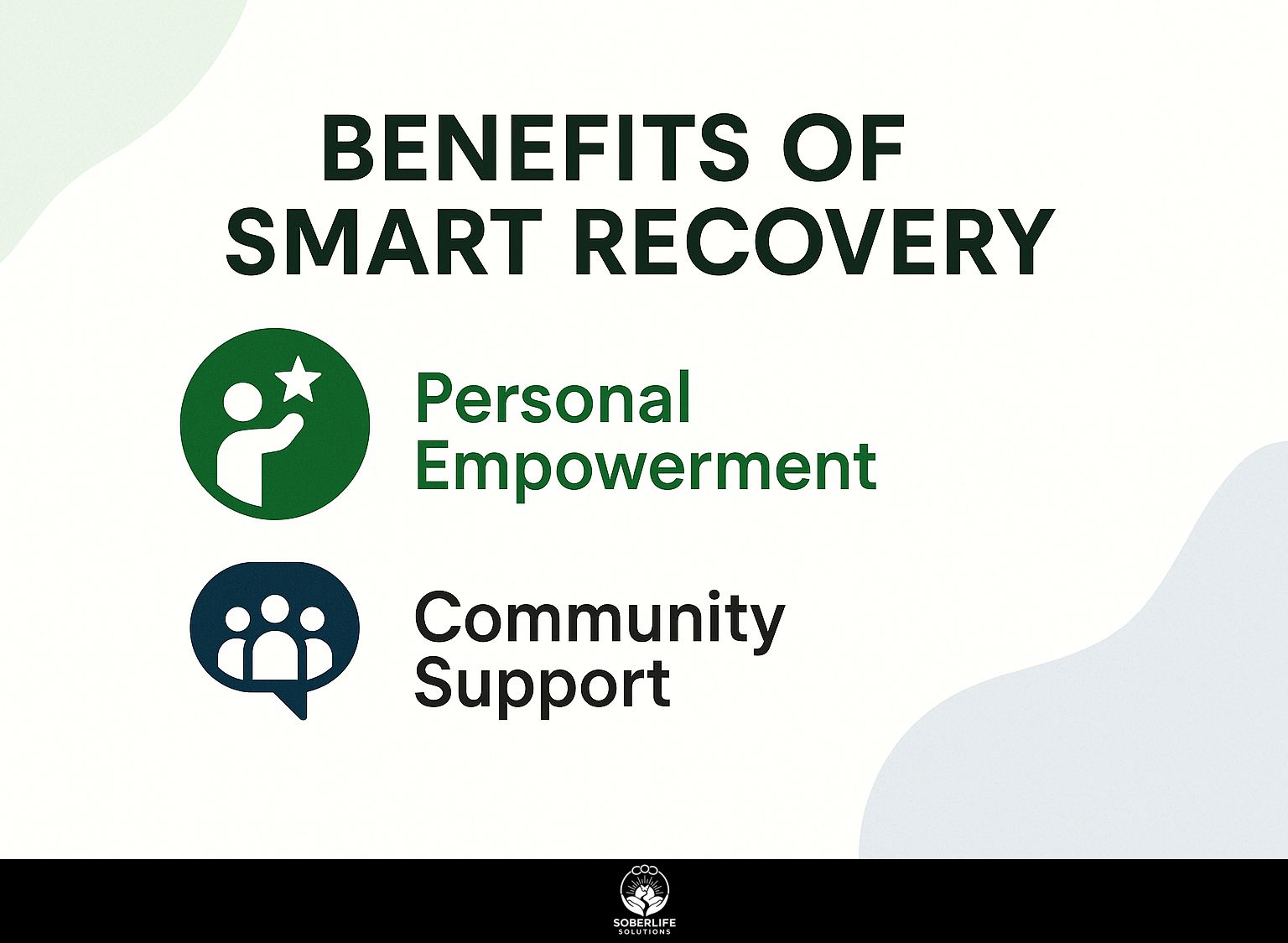
Becoming part of SMART Recovery improves your self-assurance and builds a helpful group of people.
Personal Empowerment
SMART Recovery supports individuals in handling their recovery by using self-help techniques.
Participants share their experiences in group settings, highlighting the importance of accountability and support.
For instance, using tools like daily check-in journals or recovery apps can help track progress and set achievable goals. Connecting with a peer or mentor can also reinforce commitment, providing an external source of motivation.
People gain knowledge and build a supportive group by talking with each other and telling their stories. This culture of shared support is important for maintaining long-term recovery success.
Community Support
Community support in SMART Recovery is important because it helps people meet others facing the same issues.
This connection creates a supportive setting that helps people recover. For example, group discussions often bring out common identities, helping members connect with each other’s stories and experiences.
Regular check-ins can help reinforce commitment to sobriety, providing a platform for accountability. Tools like online forums and local meetups can expand this support network.
Using these resources makes you feel involved and improves your ability to manage challenges by hearing about others’ experiences.
Comparison with Other Recovery Programs
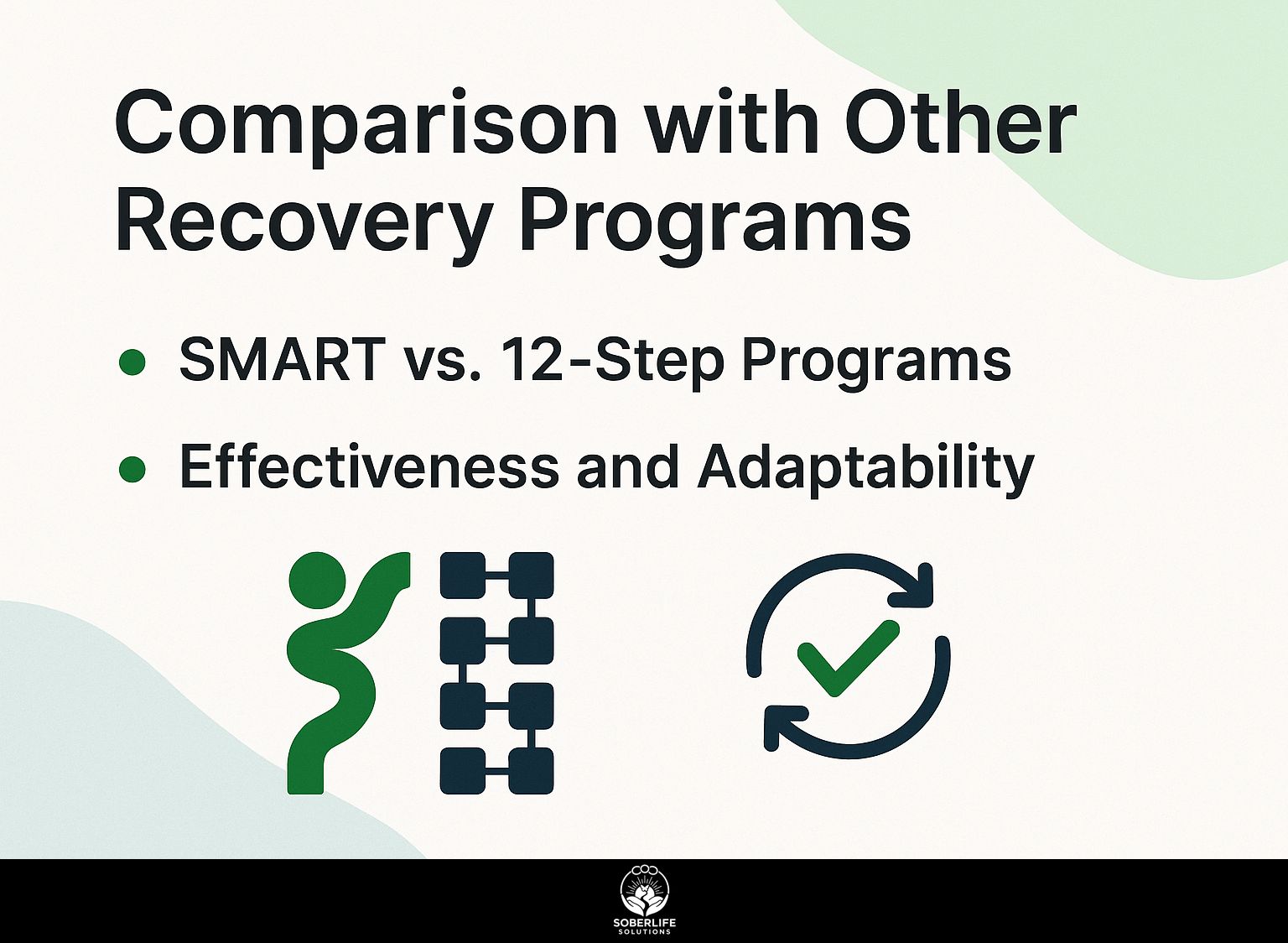
SMART Recovery offers advantages over Alcoholics Anonymous because of its approach, which is increasingly embraced through virtual recovery groups that are trending as an effective alternative.
SMART vs. 12-Step Programs
SMART Recovery and 12-Step Programs both help people with addiction, but they use different methods and principles.
SMART Recovery supports individuals in dealing with life’s difficulties using cognitive-behavioral methods. It encourages participants to set personal goals and engage in self-reflection, allowing for greater individual autonomy.
In contrast, 12-Step Programs, such as Alcoholics Anonymous, follow a structured approach involving the admission of powerlessness and reliance on a higher power. People in the group often talk about their experiences, building a sense of community support.
For example, someone in SMART can create their own plan, while a person in 12-Step might share their experiences in meetings to stay responsible.
Effectiveness and Adaptability
Studies indicate that SMART Recovery supports individuals in various circumstances.
Studies indicate that SMART Recovery is effective for people from different walks of life. For example, veterans benefit from its emphasis on self-management, reinforcing skills like goal-setting and problem-solving.
Changes for youth emphasize engaging methods, like group discussions with active participation. Tools like the SMART Recovery Toolbox offer helpful resources, including worksheets and self-evaluation materials, for different age groups. According to a systematic review on ResearchGate, these tools significantly aid in improving recovery outcomes and process variables.
The program offers both online and face-to-face meetings, providing flexibility for people looking for recovery support to choose what suits them best.
Getting Involved in SMART Recovery
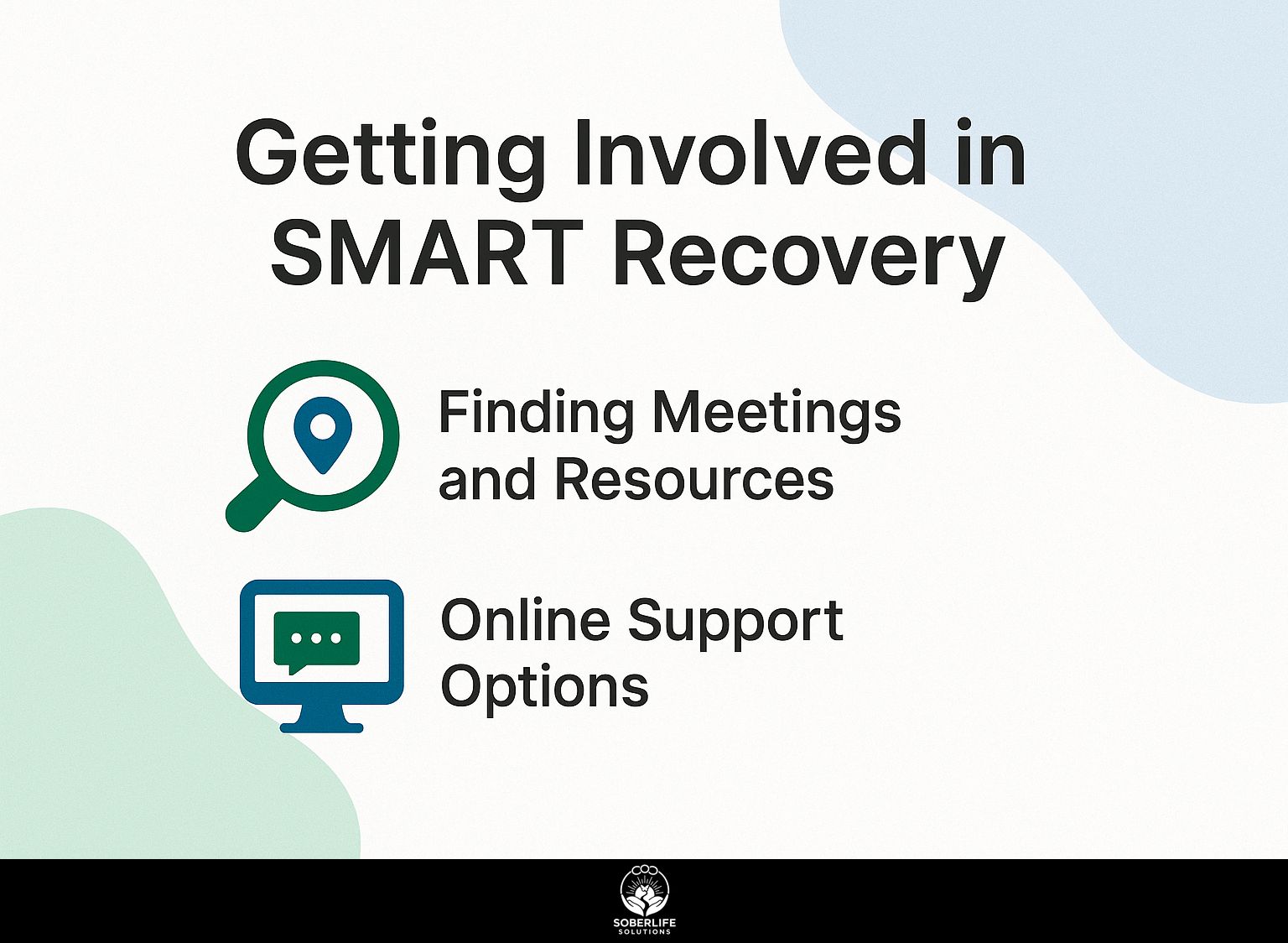
People can join SMART Recovery by going to meetings or volunteering with the group.
Finding Meetings and Resources
SMART Recovery provides tools to find nearby meetings, which help build a helpful group for recovery.
Visit the SMART Recovery website to locate meetings near you. Use their search tool to look up meetings by entering your zip code.
Consider checking community bulletin boards and local treatment centers that often list support meetings. Attending these meetings lets people share their experiences and learn useful information, which greatly improves their personal recovery plans.
Going to meetings regularly can help maintain responsibility and build relationships, which are important for lasting recovery success.
Online Support Options
SMART Recovery offers different online support options, including video meetings and discussion boards, for people who prefer to connect online.
Participants can join virtual meetings held multiple times per week, which encourage interaction and sharing experiences in a supportive environment.
The SMART Recovery forums let members talk, seek assistance, and share their experiences whenever they want.
Online support allows you to join from any location, helping you include recovery in your hectic routine.
For those interested in enhancing their recovery journey, SMART’s mobile app offers tools and help for people needing urgent support and plans during emergencies. See also: our comprehensive overview of Peer Support Groups: Definition, Benefits, and Activities to further understand the role of community support in recovery.
Frequently Asked Questions
What is SMART Recovery and what are its guidelines?
SMART Recovery is a program that helps people stop addictive behaviors and stay in recovery long-term. Its principles are grounded in addiction science and emphasize taking control, being independent, and making personal changes.
What makes SMART Recovery distinct from regular 12-step programs?
SMART Recovery chooses not to use terms like “addict” or “powerless” that are common in 12-step programs. It doesn’t include a higher power or spiritual elements. Instead, it focuses on evidence-based techniques and tools to help individuals take control of their behaviors.
What are the benefits of joining SMART Recovery?
SMART Recovery helps people by boosting self-awareness and self-control. It teaches ways to handle urges and triggers, supports creating a balanced and healthy life, and encourages making connections with supportive peers.
Do I need to stop all substance use before joining SMART Recovery?
SMART Recovery helps people choose their own plans and aims for getting better. Some may choose to stop completely, while others may aim for moderation. The program focuses on behavior change rather than abstinence.
Can anyone go to SMART Recovery meetings?
Anyone can join SMART Recovery meetings, no matter their addiction or recovery stage. The program is available to anyone looking for help and advice to stop addictive habits like drug use, gambling, or compulsive actions.
Does SMART Recovery charge a membership fee?
Joining SMART Recovery meetings costs nothing. The program is volunteer-led and funded by donations. Although some meetings might request a modest donation to pay for the materials.

